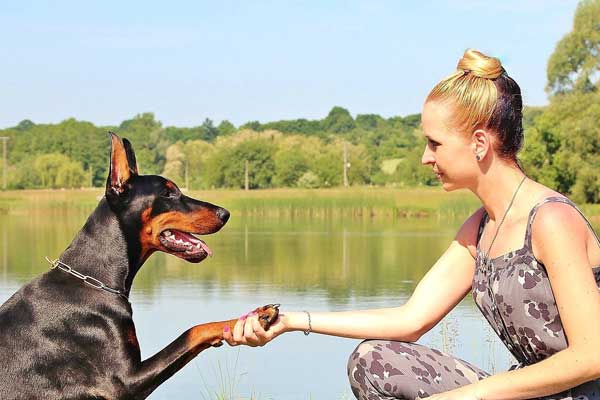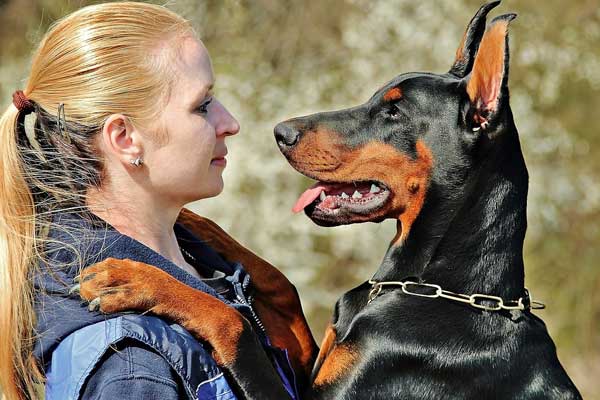Dobermans are often portrayed as fierce guard dogs in movies and TV shows but are incredibly loyal and devoted to their owners.
However, rumors persist that these intelligent and powerful dogs can turn on their masters. So, can a Doberman attack its owner? We delve into the facts and dispel any myths surrounding this beloved breed.
The Doberman Pinscher is a beautiful dog breed that usually grows to a medium or large size and is very intelligent. Progressive breeding has equipped them with agility and a vicious and destructive bite. Pair this with their great devotion and territorial mentality, and you have a protector willing to defend its territory and family against any threat.
Can A Doberman Attack Its Owner?
If you’re wondering whether Dobermans attack their owners, you’ll be pleased to hear that they don’t. Historically speaking, they are the only breed specifically bred to protect their owner and are widely known for their unwavering devotion to their master. It’s unlikely that you’ll hear a Doberman attacking its owner unexpectedly.
Statistics
According to a survey of fatal dog bites reported to the Centers for Disease Control and Prevention, 433 persons were killed by dog bites in the United States between 2005 and 2017. Only six fatalities, or around 1.4%, were related to Dobermans.
According to this survey, Dobermans were the eleventh most responsible breed for these deaths. Labrador retrievers and huskies were responsible for more fatal dog bites than Dobermans.
Max Sparwasser Law Firm presented data from media reports on severe injury or death caused by dog attacks. From 1982 through 2014, Dobermans ranked 18th among the 30 dog breeds responsible for the most severe injuries.
According to the American Veterinary Medical Association, most dog bite-related injuries occur in youngsters between 5 and 9 years old. Children, the elderly, and postal workers were the three most-bitten groups.
It’s evident from this data that Dobermans do not often attack and injure their owners. Despite this fact, Doberman attacks may still occur. So let’s discuss why they could arise in a Doberman.
Why Would a Doberman Attack Its Owner
Given their stellar reputation as a loving breed and their high intelligence, any act of aggression by a Doberman toward its master would be a surprise. However, there are instances in which a Doberman may turn aggressive. You’ll see that many of them are triggers for numerous dog breeds, not just Dobermans.
Hypothyroidism
This disorder arises when the thyroid gland does not produce sufficient thyroid hormone, resulting in an imbalance of hormones. This commonly occurs in dogs between the ages of 4 and 10. Symptoms include weight gain, hair loss, exercise intolerance, reduced appetite, and behavioral issues.
The intriguing part of this condition is that its behavioral symptoms generally emerge before its physical ones.
The behavioral disorders linked with hypothyroidism in Dobermans sometimes begin with obsessively licking and sucking on the skin of the flank (flank refers to the two thin skin flaps connecting the rear legs to the base of the body). This might progress into shyness, anxiety, or fear.
Untreated hypothyroidism may cause dogs to become so violent that their masters feel compelled to give them up to rescue groups or shelters. Research shows that hypothyroidism has not only been linked to dog-to-human aggression alone but also to dog-on-dog aggression as well.
The positive takeaway is that hypothyroidism in Dobermans is highly treatable and often includes prescription medicine to replenish the dog’s missing thyroid hormone.
Food Aggression
Like other dogs, Dobermans are highly possessive of their food. This is a survival tactic that most canines inherited from their ancestors in the wild. If a Doberman is not properly trained and is afraid of sharing or having its food stolen, it may get aggressive if someone approaches it.
Dominance Aggression
It is common knowledge in the Doberman community that their dominance may lead to problems with other dogs. As a result, same-sex aggressiveness may be a concern with Dobermans. However, dominance conflicts with humans hardly result in more than a little nip.
Fear Aggression
Since Dobermans are bred to ensure family safety, they may bite out of panic if shocked or startled. Properly socializing a dog while it’s still young will prevent this.
Predatory Aggression
Dobermans have a strong hunting drive; therefore, chasing prey, exceptionally tiny fuzzy creatures, is natural. When your Doberman is young and still figuring out what is expected of him, keep small animals and youngsters around him to ensure he gets used to them.
Territorial Aggression
These dogs know their home’s physical boundaries and may be particularly protective when they are on their own property. This inclination is usually never aimed at close family members but rather against outsiders who may enter your property.

Indications That Your Doberman May Attack You
Dobermans are not known to bite people unexpectedly. Almost often, there are warning signs that might foretell violent behavior. If he is exhibiting signs of discomfort, you will most likely notice it.
Among the most common indications that your Doberman is uneasy, apprehensive, distrustful of a situation, or prepared to bite include:
- Avoiding direct eye contact: This is particularly true if the dog is pacing back and forth close but just out of reach of a stranger. This is often linked to fear and might indicate the possibility of fear biting.
- Maintaining eye contact while remaining still: Dobermans usually maintain eye contact with someone they suspect. Unlike the previous point, this usually indicates mistrust rather than fear. These dogs naturally like eye contact, but it may be dangerous, mainly if they maintain a still position and attentively track the person with their eyes.
- Licking Lips: This might indicate that your Doberman is in pain. This does not imply that he will bite, but it does suggest that he is agitated and nervous.
- Exposing teeth, snarling, or snapping: This is a far more evident indicator that your Doberman feels uneasy and is generally intended as a “last warning.”
- Stiff Body: When your dog is nervous, every muscle stiffens, shifting its weight slightly more on its two front feet. If your dog assumes this body posture, it indicates he is highly uncomfortable in a specific scenario. He’ll be standing directly towards their target; ears pricked as if they were frozen.
- Hackles raised: If the ridge of hair down the spine of your Doberman (known as the “hackles”) is elevated, he is clearly on edge. This is especially evident in Dobermans high on the back around the shoulder blades. When a dog is threatened, his neck or back hair will rise.
Importance of Socializing and Proper Training
How your Dobermans were reared and socialized is arguably essential in influencing how probable any given situation will trigger them. If your dog comes from a shelter or has a history of abuse, their trigger may be provoked more rapidly than canines reared in more caring settings.
When properly trained and socialized, a Doberman may be a trustworthy family pet for young children and elderly people. To ensure your dog develops into a reliable adult, exposing them to as many people and situations as possible throughout the first year of its life is essential.
Start socializing your dog early and regularly with new environments, sounds, animals, canine companions, and human beings to help smooth his transition into his new environment. Then, shower your dog with affection. These are the ideal practices for ensuring your Doberman grows into a peaceful adult.
If their limits are established, and they know what is expected of them, they will usually be delighted to comply.
Can Dobermans be aggressive toward their owners? Yes, but only if your Doberman was not properly socialized or trained. These two factors may be the most influential in determining their tendency to get agitated.
Parenting a dog is similar to raising a kid in that you must treat them with kindness and sincerity. If you raise a Doberman as a guarded friend or family member, the odds of them turning against you are very low.
